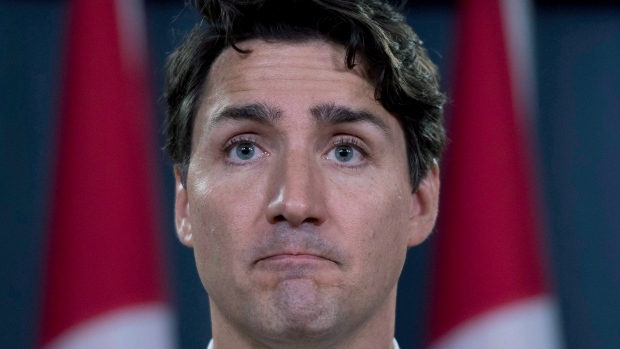Jun 27, 2017
Canada will keep working with U.S. on softwood resolution: Trudeau
The Canadian Press

OTTAWA -- Prime Minister Justin Trudeau says his Liberal government will continue to work with the U.S. administration to find a resolution to the latest chapter of the long-running dispute over softwood lumber.
Trudeau says Canada has repeatedly emerged triumphant each time the U.S.-Canada softwood dispute lands in the courts, and expects the same outcome again.
Late Monday, the U.S. Department of Commerce hit Canada with an additional 6.87 per cent in preliminary average anti-dumping tariffs, leaving the industry facing average duties of about 27 per cent.
The newest anti-dumping duty will overlap for about two months with average preliminary countervailing duties of 19.88 per cent announced in April that are set to expire Aug. 27.
A statement late Monday from Natural Resources Minister Jim Carr and Foreign Affairs Minister Chrystia Freeland promised to "vigorously defend" the sector, "including through litigation."
Unifor president Jerry Dias calls the latest round of tariffs a "slap in the face" to fair trade that pushes the lumber industry closer to the edge of crisis.
The union, which represents some 24,000 workers in the sector, estimates that sustained combined duties of 25 per cent could eventually result in 25,000 lost jobs north of the border.
The anti-dumping duties were a bit lower than some analysts had expected, but Trudeau said Tuesday he wasn't going to get into whether Canada's negotiating had anything to do with it.
- Why New Brunswick has much more riding on lobsters than softwood
- Canada unveils $867M softwood aid package; vows to 'vigorously' fight U.S. duties
- Freeland: Canada, U.S. remain 'very far apart' on softwood lumber
SOFTWOOD LUMBER DISPUTE
"I'm not going to be a pundit on this," he said. "I'm very much focused on being constructive, on working through the relationship, ensuring we are moving towards a deal."
Trudeau said the introduction of both countervailing and anti-dumping duties is similar to past softwood disputes, although he acknowledged the anti-dumping tariffs were less than the 10 per cent analysts had expected.
"But this is still an issue that affects thousands of jobs across the country in small communities," the prime minister said. "It's something we take very, very seriously and will endeavour ... to continue to work very, very hard on with the American administration."
Conservative MP Randy Hoback, the official Opposition critic for Canada-U.S. relations, said Trudeau had a deal in hand with the former administration of President Barack Obama and he let it slip away.
Hoback is in Montana for a meeting with western governors, where he said opinions of softwood vary depending on the state. But he said the general consensus there is that a deal would have been possible had Canada more quickly embraced the Trans Pacific Partnership, a trade deal Obama wanted but which the U.S. has walked away from under President Donald Trump.
"They were looking for us to show leadership on TPP," Hoback said.
"If we would have done that instead of doing another year of consultations across Canada, it would have given Obama the cover to push it through, and then would have also given us the ability to negotiate a softwood lumber agreement."
Canada has pledged to challenge the softwood tariffs either in court or through international trade bodies such as the World Trade Organization. It can't do that, however, until the U.S. Department of Commerce makes its final determinations on both duties, expected late this year or early in 2018.




